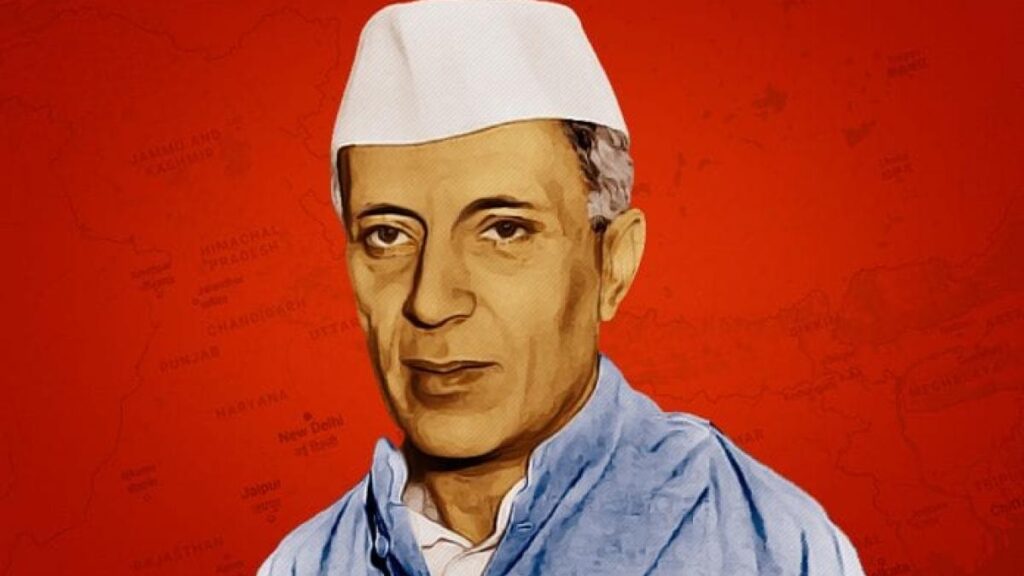Dead men are not bothered by what later generations think of them. How to honour them and memorialise their legacy are questions that trouble those who come after. There are no easy answers. The luxury of time, and the hindsight that comes with it, allow a clear-eyed assessment of the dead. Rather, it should. But when slavish sycophancy or prejudiced bigotry colour the evaluation, it produces hagiographies or erasures, and both are detrimental to history. The controversial poster of the Indian Council for Historical Research (ICHR) to celebrate India’s 75th year of independence, which pointedly leaves out Pandit Jawaharlal Nehru among others, exemplifies both the pettiness of the organisation and the grand design of the ruling party.
Nobody can write a history of independent India without generous references to Nehru, the first Prime Minister of an impoverished and partitioned land who led the unenviable task of nation-building across domains, from the political and constitutional to brick-and-mortar institutions. Nehru’s accomplishments are many. There is vast—and often hagiographic—literature on his 17-year reign till he passed away in 1964. However, Nehru’s decisions, view of India’s syncretic culture, books he wrote, the institutions and democratic foundations his government set up despite an array of doubters, and the international respect for India post-1947 are part of his legacy. So are the mistakes he made on the political front, on primary education, with China, and so on.
Nehru came to the job after spending nearly nine years in various phases as a political prisoner in British India. He argued for “purna swaraj” when it was not a popular demand and steered the 1931 Karachi resolution, which articulated India’s democratic and welfare state model. In sum, Nehru was deeply Indian yet global, understood Hindu culture but secular, conversant with the Vedas but not religious, polite about traditions but devoted to building scientific temper. He was also, by all accounts, fiercely committed to his political ideology and therefore strongly opposed to the Hindu Mahasabha-Rashtriya Swayamsevak Sangh, though he accommodated Syama Prasad Mookerjee in his first Cabinet.
Nehru’s stature drew praise in many quarters, and on his death, The Economist ran a cover story titled “World without Nehru”, while The New York Times called him “maker of modern India”. But the Mahasabha-RSS did not come around. They hated him. His idea of India clashed with their dream of a Hindu Rashtra. Every year India spent on the Nehruvian path made the realisation of their dream difficult. The RSS, and by extension Hindu right-wing, did not merely dislike Nehru and oppose the idea of democratic-secular India; it deeply despised them, sought to overturn them. RSS-trained political leaders were savvy enough to pay lip service to Nehru now and then. It changed in 2014.
Prime Minister Narendra Modi and then BJP president Amit Shah threw off the savoir-faire cloak to reveal the hatred in full measure. Their mission, by their admission, was to create a “Congress-mukt Bharat”, but it went well beyond political opposition to complete erasure. It meant slurring the Nehru-Gandhi family—given the Congress and the family had unfortunately become synonymous—discrediting initiatives of the Nehru era, smear campaigns against Nehru to spread falsehoods about his personal life, or dishonouring his memory at every possible turn.
The agenda is clear: erase Nehru and rewrite independent India’s past. The two are inextricably linked. In a government more authoritarian than democratic, this is not difficult as institutions bend to the will of the ruling elite. The ICHR poster is one part of the grand revisionist movement to erase all which challenges the Hindu Rashtra concept. The ICHR is, after all, a body of the Union Ministry of Education. The Jallianwala Bagh makeover into a glitzy tourist venue with the sound-and-light show, the new course in Jawaharlal Nehru University that labels “jihadi terrorism” as the only fundamentalist-religious terrorism are examples from other domains.
The government is single-minded about its agenda to erase Nehru, the man and the institutions associated with him, and our collective memory of Nehruvian India. Project Erase Nehru is not limited to a poster. It extends across disciplines from architecture, archives, institutions or bodies, and more. In the right-wing textbook, re-wiring education is critical to rewriting history. To erase (or elevate) personalities and present revisionist history based on prejudice or pettiness is par for the course. Mughal emperor Akbar is sought to be obliterated, his adversary Maharana Pratap reappears as the victor of the Haldighati battle. Mahatma Gandhi is glossed over in textbooks; his assassin Nathuram Godse is justified. Vinayak Damodar Savarkar becomes a great icon of the freedom movement; the Congress is called the “nurtured baby” of the British. And so on.
Those who still debate the BJP’s intentions, or more accurately, Modi-Shah’s intentions towards Nehru’s legacy, miss this agenda. Whether the project succeeds or not is a moot point. What is disconcerting is the lackadaisical, lacklustre and ad hoc response from the political opposition, Congress party, the Nehru-Gandhi family, and civil society.
India’s political opposition must know that the nation is older-larger than its present government, and to rewrite national history to obliterate one of its longest-serving Prime Ministers, does not augur well. However, opposition parties are busy fighting other battles. The Congress displays a puzzling duality. While a few leaders go ballistic in calling out the BJP on this, many hold their silence. They probably fear that defending the Nehru years will attract the dynasty charge. The fact is that the BJP has skilfully equated dynasty with the Congress in popular imagination while allowing multiple dynasties to flourish in its front and back yards, to much less criticism. The Congress party must find ways to defend Nehru’s legacy and own it because it is also partly India’s history.
The Nehru-Gandhi family has a natural right to speak about Nehru, but Rahul Gandhi, more visible than his mother or sister, does not speak of his great grandfather as much as he can. The family owes it to Nehru’s memory to address the systematic erasure. The family and party must diligently re-present Nehru to younger generations. It’s easy to see why the BJP appropriates Mahatma Gandhi, Sardar Patel, Subhas Chandra Bose, even BR Ambedkar and Bhagat Singh—who ideologically opposed Hindutva—but dishonours Nehru. For Nehru’s sake but equally for India’s history, the burden of setting this right rests with both the family and the Congress.
Civil society is more complex to address. Even those who benefited in the Nehru years or from Nehruvian institutions are reluctant to speak up or challenge others to debate his policies. The classic Spiral of Silence theory—fewer and fewer people voice unpopular views for fear of being singled out—is increasingly at work here. But if the Congress and/or the Gandhis offer conversational points, at least a section of the civil society may riff on them. All platforms that revisit or reassess Nehru offer opportunities which must be embraced.
The thing is, even if the BJP rewrites India’s past, there are international records and histories that it cannot easily touch. Nehru cannot be erased without striking off the first 17 years of independent India from all records. However, because his erasure in India is vital to RSS-BJP’s Hindu Rashtra plans, it will keep trying. George Orwell articulated this best in “1984”: Those who control the present control the past, and those who control the past control the future.
(The author, a senior Mumbai-based journalist and columnist, writes on politics, cities, media and gender. Courtesy: Newsclick.)




